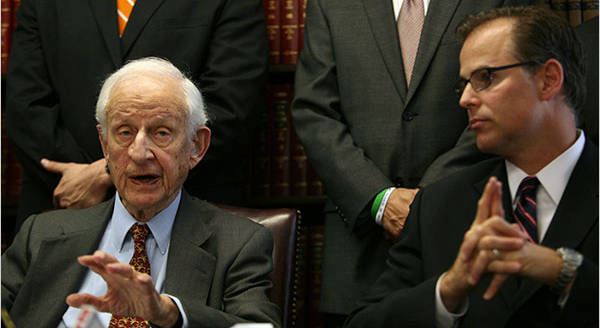Dear Judge Oetken,
Thanks to my fellow blogger
Steven Bodzin, I found out about the latest in the lawsuit brought against Derwick Associates that you are currently dealing with.
I have read most of the
documents. The issue of strongest contention between the parties seems to be jurisdiction.
Daimler vs Bauman is cited throughout, both in support and opposition to motion to dismiss.
While I am certain that strict rules of due process are applied to this lawsuit, I think it would be travesty if you ruled in favour to dismiss. You won't have trouble finding reason against such motion based on evidence provided by the very party desperately pleading for dismissal. And I am talking about public, readily available, evidence.
As an exercise, you could for instance challenge Betancourt's legal
counsel to furnish publicly available evidence to back claim that he
voted, presumably in Venezuela, "19 times in the two and a half year
period" prior to this lawsuit's commencement in 2013.
You could also read claims made to the Wall Street Journal by one member of Derwick Associates' numerous legal team, Adam Kaufmann, former prominent Chief Investigator of New York's DA Office: "
We are a transparent company and have nothing to hide."
Ask yourself: why would a "transparent company" with "nothing to hide" spend hundreds of thousands of dollars in lawyers, precisely and specifically, to stop information about its activities to become public? Does that strike you as "transparent"?
Furthermore, if we take Derwick's legal counsel's no-jurisdiction argument at face value, why is it so important for them to keep their activities in the USA hidden, if, indeed, they are a Venezuelan concern with no significant interests in the USA? Derwick's associations with US entities, such as ProEnergy Services, did not, in any way, hinder its ability to get public contracts in Venezuela. Quite the contrary. Having hundreds of millions of dollars in different US bank accounts, a considerable portfolio of US properties, US companies and investments, and bona fides from some of the US most reputed banks and law firms allowed Derwick to operate unconstrained from jurisdictional hurdles. In fact, had it not been for what could be termed as the very efficient American services industry, Derwick would have been unable to even acquire property in US soil. For Derwick did not produce letters from their banks in Venezuela, as guarantee for multimillion dollar property purchases. Derwick does not fly internationally in Venezuela-registered planes. Derwick did not execute its contracts by subcontracting Venezuelan, but American companies. As Pedro Trebbau admits, Derwick holds very little capital in Bolivares (Venezuela's official and only currency, subject to official currency controls) in Venezuelan banks.
But then, you must pay special attention to the fact that Derwick initiated legal proceedings against a Venezuelan bank, in New York courts in 2012. This Derwick did voluntarily, without coercion of any sort. No one forced Derwick to start a lawsuit in New York, and by doing so it not only admitted but actively sought the jurisdiction of New York courts to seek redress for a uniquely Venezuelan dispute: i.e. a defamation claim, brought by Derwick against a Venezuelan bank and its execs, for material published in Spanish, in a Venezuelan website, to a Venezuelan audience. Derwick decided to move its case subsequently to Florida, where it failed, spectacularly, at arguing its spurious defamation case successfully. Ultimately, Derwick's claim was dismissed with prejudice by a colleague of yours.
Ask yourself: how come New York court system was a valid venue, from a purely jurisdictional point of view, for Derwick to remedy a defamation case among Venezuelan parties in 2012, but it is not in 2013? I am sure you will agree that Derwick's non-jurisdiction argument is, quite simply, untenable.
Consider also the wider implications of granting a dismissal. As, arguably, Venezuela's foremost anti corruption blogger, I can assure you that there's not a chance of a scandal of this magnitude, that touches so many powerful figures of Venezuela's current government, to be heard in that country totally corrupt court system. Many of the actors involved in this saga are hugely powerful, so powerful in fact, that one of them managed to have Venezuela's Civil Code "reinterpreted" by the Supreme Court, so that a marriage ruling against him -obtained through fraud- was reverted. We are talking about the Chair of Venezuela's Congress, arguably the ruling party's top figure; we are talking about Venezuela's Ambassador to the UN, and former CEO of PDVSA and Minister of Energy; we are talking about owners of Venezuela's largest banks; we are talking about an international criminal organization, for these are not your regular defendants, but folks that, effectively, control Venezuela, for all intents and purposes a failed state.
It may sound impertinent coming from me, but you must put yourself in the proper geopolitical, historical and legal context when ruling time comes. If you are unaware of it, do ask to be briefed on FINCEN's or President Obama's Executive Order about Venezuela. Do find out, if you can, what is currently happening with Derwick Associates in New York's DA's office, the Security and Exchange Commission, Treasury Department, FBI, State Department, Homeland Security and DEA. If you could, check ramifications that touch Derwick, currently being investigated and exposed in Spain's media, with respect to laundering of billions of dollars in Spain and Andorra where actors associated with Derwick are involved. Only today, news broke about one of
Derwick's bankers of choice having been singled out as a "priority target" by Spain's Anti Money Laundering Investigation Unit. Another of Derwick's bankers has been named in a Florida lawsuit that the Venezuelan State is bringing for misappropriation of millions of dollars, while a third, father in law of one of the defendants in your case, is actively collaborating with US law enforcement.
Your honour, understand that this is a historical opportunity.
Cordially,
Alek Boyd















